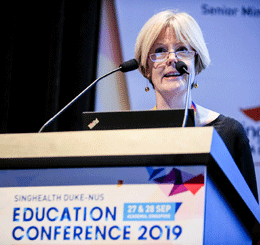A Good Death How a Dramatic Stage Play Is Used to Illustrate Aspects of Palliative Care to Medical Students
Date: 17 Sep 2022, Saturday | Time: 1520 - 1825 | Track Type: Intra-Conference Workshop | Format: Face-to-face | Venue: Seminar Rooms L2-S3 & L2-S4, Academia
Speakers: Asst Prof Ong Eng Koon, Prof Lalit Kumar Radha Krishna, Clin Asst Prof Zhou Xuelian Jamie, Ms Chiam Min, Ms April Thant Aung
Clinician-educators may hesitate to employ the humanities in teaching despite its potential benefits. Reasons include a lack of personal expertise and local materials, and poor participation from learners. We would like to share our experiences in mitigating these barriers and inspire like-minded educators through our positive experience.
This practical hands-on workshop is for educators who are interested in employing the humanities in their teaching but are unsure about how to do so. We will present a novel educational programme from the Division of Supportive and Palliative Care at the National Cancer Centre Singapore for medical students rotating through the department.
A Good Death is an original local play first presented by the Esplanade in 2018 and is a tender illustration of the strength of the human spirit in times of grief. The multifaceted relationships between the physicians, patients, and caregivers are skillfully portrayed by the lead actress who magnifies emotions like anger, depression and regret for the audience. The play is used to facilitate discussions on professional identity, caregiver stress, grief in sickness and death and dying with our medical students.
We will demonstrate how the Gagne framework of instructional design can be employed to design a programme based on the humanities. We will also share touching outputs and feedback from the various students who have gone through the programme.
Participants in this workshop will have the opportunity to view snippets of the play and participate in reflective practice about their own professional identity. They will also play the roles of both the facilitator and the learner through intimate small group discussions. Participants will be taught about facilitation processes and material choices that will allow similar programmes to be initiated in their respective departments.
Learning Outcome(s):
By the end of the workshop, participants will be able to:
- Identity a framework to design a humanities education programme.
- Observe snippets of a play that is used for medical education.
- Participate in small group discussions as both the facilitator and learner using the humanities to discuss various themes like professional identity and caregiver stress.
- Receive feedback on potential projects that may be initiated in their respective departments.
Target Audience:
All are welcome
Stay Healthy With
© 2025 SingHealth Group. All Rights Reserved.
















